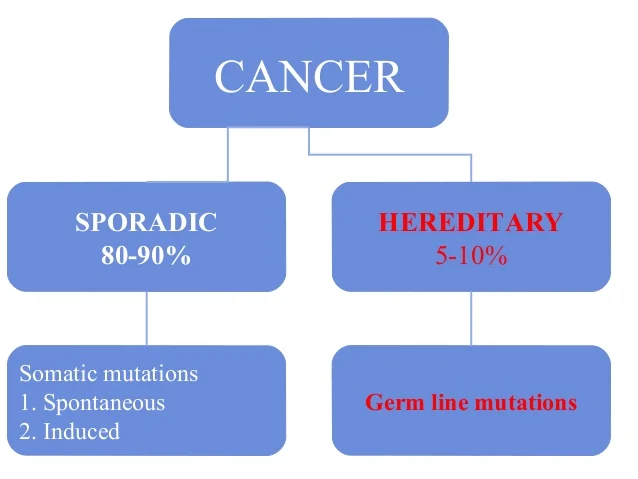Hereditary Cancer Syndromes: Know Your Risks (BRCA, Lynch, FAP)
Share IT

Launch Your Dream Website with Us!
Click Here to Get in touch with Us.
Categories
Hereditary Cancer Syndromes
An Understanding of Lynch, FAP, and BRCA Hereditary Cancer Syndromes
A family history may occasionally raise your risk of developing cancer, which is a complicated illness. Groups of cancers known as hereditary cancer syndromes are more likely to develop in families as a result of particular gene mutations that are passed down through the generations. Three prevalent hereditary cancer syndromes will be discussed here: familial adenomatous polyposis (FAP), Lynch syndrome, and BRCA1/BRCA2 mutations.
Thank you for reading this post, don't forget to subscribe!Table of Contents

- Mutations in the BRCA1 and BRCA2 genes
The genes BRCA1 and BRCA2 generate proteins essential for DNA repair. A person’s lifetime chance of getting some malignancies can be greatly increased by mutations in these genes, especially:
- Breast cancer: BRCA-mutant women are far more likely to have breast cancer, especially if they do so early in life.
- Ovarian cancer: The risk of ovarian cancer is also increased by BRCA mutations.
- Other cancers: Men who carry BRCA mutations may be more susceptible to prostate and breast cancer. Furthermore, these alterations may make men and women more vulnerable to melanoma and pancreatic cancer.
- Pattern of inheritance: BRCA mutations are inherited in an autosomal dominant manner. This indicates that a parent’s lone altered copy of the gene can raise a child’s risk of developing cancer.
- Hereditary Nonpolyposis Colorectal Cancer, or Lynch Syndrome
Another genetic cancer syndrome is Lynch syndrome, sometimes referred to as hereditary nonpolyposis colorectal cancer (HNPCC). Gene mutations pertaining to DNA mismatch repair are the root cause of it. These mutations raise the chance of getting a number of malignancies, chiefly:
- Colorectal cancer: Lynch syndrome carriers have a markedly increased risk of colorectal cancer, frequently starting at a younger age than the general population.
- Endometrial cancer: Uterine endometrial cancer is another risk factor for women with Lynch syndrome.
- Other malignancies: malignancies of the stomach, ovaries, pancreas, and urinary system are among the additional cancers linked to Lynch syndrome.
- Lynch syndrome: has an autosomal dominant inheritance pattern, which is comparable to the inheritance pattern of BRCA mutations.
- Adenomatous polyposis familialis (FAP)
The development of many precancerous polyps (adenomas) in the colon and rectum is a characteristic of the genetic syndrome known as familial adenomatous polyposis (FAP). The APC gene is mutated, which causes FAP.
Symptoms: Until polyps get large enough to cause bleeding or intestinal blockage, FAP usually has no symptoms. Typical symptoms may consist of:
Hereditary Cancer Syndromes
- bleeding in the rectal area
- Constipation or diarrhoea
- stomach ache
- Anaemia
- Dangers: If treatment is not received, individuals with FAP are almost certain to acquire colorectal cancer. In order to avoid cancer, early polyp identification and eradication are essential. Additionally, there’s a marginally elevated chance of developing other malignancies, like stomach cancer and connective tissue tumours called desmoid tumours.
FAP is inherited according to an autosomal dominant inheritance pattern.
Hereditary Cancer Syndromes
Risk management and genetic testing
Hereditary Cancer Syndromes
These inherited cancer syndromes can be identified by genetic testing for mutations linked to them. People are better equipped to make educated decisions regarding their health thanks to this information. Among the techniques for risk management are:
- Increased cancer screening: Early cancer detection can be achieved with more regular tests, such as colonoscopies for FAP or mammography for BRCA mutations.
- Preventive surgery: It may occasionally be advised to remove high-risk organs, such as the ovaries or breasts, in order to screen for BRCA mutations.
- Modifications in lifestyle: All people, including those with inherited disorders, can lower their risk of cancer by eating a balanced diet, exercising frequently, and maintaining a healthy weight.
Hereditary Cancer Syndromes
It is imperative that you speak with your doctor if any of the malignancies linked to these disorders run in your family. They can evaluate your risk factors and talk to you about getting tested for genetics. For those with hereditary cancer syndromes, early identification and risk reduction can greatly enhance prognoses.

Launch Your Dream Website with Us!
Click Here to Get in touch with Us.





























































Recent Comments